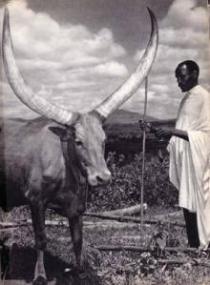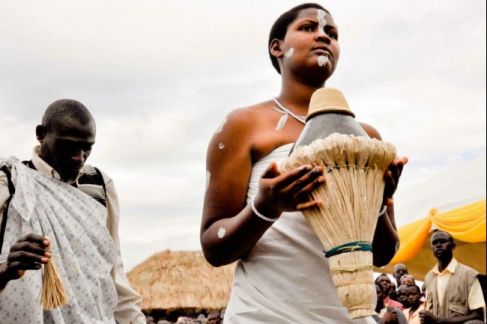The story of the beginning is similar in the kingdoms of Bunyoro, Toro and Ankole. This is because they were once united under one kingdom:Bunyoro Kitara and just split later to form smaller denominations of the once mighty and epansive Kitara. Legend might defer a little between each tribe but below is the general myth of the story of creation carried by these tribes.
In the beginning, Ruhanga, the creator lived in space with his brother Nkya. Nkya who was younger and restless complained he was bored with everything being so normal and mundane. Ruhanga created heaven and earth for his brother. He threw a stone in the air and it became the sun. Nkya was happy with this but soon started to complain again about the constant sun and no shade. Ruhanga moved the sun to the West and covered it with a cloud. He then threw another stone in the air and created the moon. He ordered Nkya to sleep and created the cock to crow to wake Nkya up when night had passed. He also created grasses and trees for more shade. He then ordered Nkya to stay on Earth while he returned to attend to matters in Heaven.
In heaven Ruhanga realized his hands were dirty and washed his hands which proceeded to pour down to Earth as rain. Nkya got drenched and complained to Ruhanga. He told Nkya to break off branches cut the grass and make shelter but Nkya had no tools. Ruhanga got a rock and threw it to the ground and it broke to make a knife, an axe and a hammer. Nkya went ahead to make a hut.
He soon got bored again and demanded for something to look at. Ruhanga then created flowers, shrubs, goats and sheep. He also created cattle which pleased Nkya immensely. He made a bowl and showed Nkya how to milk the cows. He also created a creeper that provided more food for Nkya. This time Nkya has so many things to occupy him in the new world and he was impressed. He enjoyed his time on earth but tending to everything was a lot of work. Ruhanga gave him a son who Nkya called Kantu.
In time the work was still a bit hectic for Nkya and Kantu, so Ruhanga gave him 3 other sons. There was confusion because all of them were called Kantu. So Ruhanga devised means to test Nkya’s sons and name them according to how they performed. For the first test, Nkya hid three items at a junction on a path far from home. He put a basket of sweet potatoes, strips of ox hide and the head of the ox. He then sent his sons on the same path.
On reaching the junction, the eldest son saw the basket of potatoes and immediately bullied his brothers and ate the food alone. The second born saw the stripes of hide and thought they would be important for tying the cows when milking. The youngest one didn’t want to be left out so he carried the ox-head back home. When Nkya saw them return he gathered them and asked them what had happened. He was so angry at the first borne for eating all the food and not sharing with his brothers. He made arrangements for the second test.
At night, he gave them pots of milk and ordered them to carry them through the night and not to spill any of it. They then retired for the night. The youngest boy fell asleep first and spilled all his milk. He woke up to the horror of the situation and pleaded with his brothers to help him. They each contributed a bit of their milk and the young boy filled his pot again. This time he stayed awake since he had rested enough and was alert.
Towards the morning, the older brother couldn’t hold back the sleep and dozed of and spilled most of his milk. He pleaded with his brothers to help him too but since they had already shared with the younger brother, it was not enough to fill a pot and his brothers refused to give him more milk. Their father awoke and went to check on the boys.
He was so pleased with the youngest brother that he had managed to stay awake all night and present to him his pot of milk. The other brothers were filled with jealousy and told their father that he had spilled his milk first and they had shared some of theirs to help him refill his pot. Nkya was impressed how the youngest son had managed to convince his brothers to share the milk despite the repercussions. He recalled the way the young boy had carried back the heavy ox-head from their earlier journey, despite not knowing what he would use it for. He immediately named him Kakama and gave him authority to rule over his brothers and everything on earth.
For the second born, he recalled the love for cattle the boy had. He’s the one who had carried back the ox-hide stripes so he could tie the cow’s legs while he was milking. Nkya named him Kahima, the cattle herder and gave him authority over all the cattle. He was least pleased by the eldest son. First he had shown his greed by eating all the sweet potatoes, then had also spilled all his mikl and had nothing to present to his father in the morning. He called him Kairu and gave him the hardest responsibility of titling the land to provide food for his brothers and their descendants.
Till recent history this is how people of this region lived. The descendants of Kakama (Omukama) were royals who ruled over the people and inherited kingship from their great grandfather the smart and clever younger brother. The Bahima were cattle herders by lifestyle and descendants up-to date still have hundreds of herds of cattle which they pride in and treasure. The Bairu were agriculturalists and peasants who did all the hard labour of providing for the kingdoms. They traded alot of food for little pieces of meat and pots of milk provided by the Bahima.
Today this caste system is irrelevant but in some places deep in these regions people still refer to the system to assert their authority over others.



